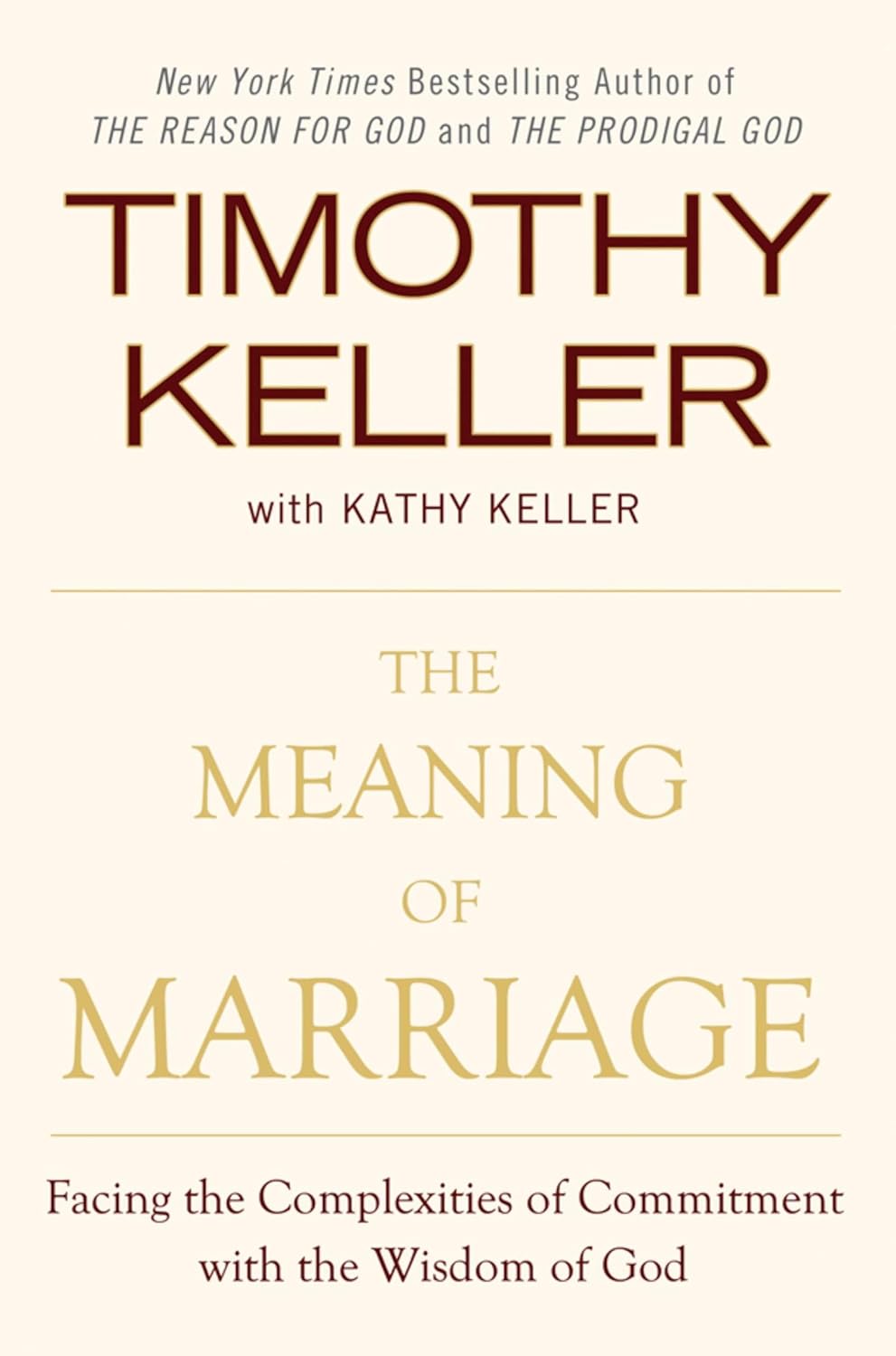The Meaning Of Marriage By Timothy Keller Book Review
If you click a link in this blog post and make a purchase I may receive a sponsored commission at no extra cost to you and this will help us to continue sharing this ministry.
Marriage it’s a word that carries both beauty and weight. Whether you’re single, engaged, newly married, or celebrating decades together, chances are you’ve wrestled with what marriage truly means. Is it just companionship? A romantic partnership? A lifelong promise? In The Meaning of Marriage, pastor and author Timothy Keller, along with his wife Kathy Keller, offers one of the most insightful, biblically grounded explorations of marriage you’ll ever read.
This book isn’t your typical “how-to” marriage manual. It doesn’t focus on date nights, communication techniques, or conflict resolution strategies though those are important. Instead, Keller digs deeper, exploring the theological and spiritual foundation of marriage as designed by God. His approach is both intellectually rich and pastorally gentle, making readers feel both challenged and encouraged. So let’s unpack the essence of Keller’s message and how this remarkable book can transform the way you view love, commitment and covenant.

CLICK HERE TO BUY BOOK ON AMAZON
1. The Foundation: Marriage as a Reflection of the Gospel
From the very beginning, Keller roots his entire book in one unshakable truth that marriage is a reflection of the Gospel of Jesus Christ. That means it’s not primarily about personal happiness but about displaying God’s love and covenantal faithfulness to the world.
Keller draws from Ephesians 5, where Paul compares marriage to the relationship between Christ and the Church. The husband’s call to love his wife “as Christ loved the church” is one of sacrificial service, while the wife’s call to respect and support her husband reflects the Church’s loving response to Christ.
This framework reframes marriage from something built on fleeting emotions into something anchored in divine purpose. Keller writes, “The reason that marriage is so painful and yet so wonderful is because it is a reflection of the gospel, which is painful and wonderful at once.”
It’s a humbling truth. Marriage becomes not just about finding the “right person,” but about becoming the kind of person who can love as Christ loves.
2. The Challenge of Modern Views on Love and Marriage
Keller doesn’t shy away from confronting modern culture’s distorted view of marriage. In a world where relationships are often based on convenience, compatibility, and self-fulfillment, he argues that we’ve lost sight of what marriage is supposed to be.
He explains that today’s culture prioritizes individual happiness above all else. Many people enter relationships hoping to find someone who will “complete” them someone who fits perfectly into their life goals and personal dreams. But this approach, Keller warns, places an unrealistic burden on the other person.
Instead, he calls believers to look beyond consumer-style relationships to covenantal ones. A covenant, unlike a contract, isn’t about what you get it’s about what you give. It’s a binding promise of unconditional love, mirroring God’s steadfast commitment to His people.
This section is powerful because Keller doesn’t just preach at readers he understands the tension between cultural expectations and biblical truth. He empathizes with modern struggles while still gently pointing us toward God’s design.
3. The Role of Friendship in Marriage
One of the most beautiful insights Keller offers is his understanding of friendship as the core of marriage. Many couples enter marriage with the idea that romantic attraction or sexual chemistry will sustain them. But Keller reminds us that friendship is the heart that keeps love alive.
He defines friendship as “deep oneness that develops as two people journey together toward a common horizon.” That horizon, of course, is Christ. When a husband and wife are both pursuing Jesus, their shared spiritual purpose strengthens their bond in ways that superficial attraction never could.
He also emphasizes that friendship in marriage requires intentionality spending time together, listening deeply, encouraging each other, and growing side by side. Friendship-based love endures through seasons when emotions waver because it’s rooted in something eternal.
Kathy Keller, in her own reflections throughout the book, adds warmth and authenticity to this idea. Her perspective as both a wife and ministry partner adds depth and balance to the discussion.
4. The Purpose of Marriage: Holiness Over Happiness
Keller delivers one of the most profound takeaways of the entire book: the purpose of marriage is not happiness, but holiness.
That may sound counterintuitive at first after all, who doesn’t want a joyful marriage? But Keller explains that true joy flows out of spiritual growth. Marriage is designed by God to refine us, expose our selfishness, and make us more like Christ.
He writes, “Marriage is a way for two spiritual friends to help each other on their journey to become the persons God designed them to be.”
This view of marriage as a refining fire helps couples see challenges differently. Instead of viewing conflicts as signs of failure, Keller invites us to see them as opportunities for grace. When spouses forgive each other, serve each other, and persevere through difficulty, they are living out the Gospel in real time.
It’s not easy but it’s deeply rewarding. The holiness that marriage produces leads to a deeper, more lasting kind of happiness.
5. The Beauty of Sacrificial Love
At the center of every healthy marriage is sacrificial love the kind that Jesus modeled. Keller shows that love in marriage isn’t primarily a feeling; it’s an action. It’s choosing to serve and honor your spouse, even when emotions are low or circumstances are hard.
This kind of love transforms relationships. Instead of keeping score or demanding fairness, it asks, “How can I bless my spouse today?”
Keller’s honesty about the difficulties of this kind of love makes the message relatable. He admits that no couple naturally practices sacrificial love perfectly, but through the power of the Holy Spirit, we grow into it. The more we understand God’s unconditional love for us, the more we’re able to extend that same love to others especially our spouse.
This perspective redefines romance from mere emotional satisfaction to spiritual devotion.
6. Singleness and the Bigger Picture
One of the most refreshing parts of The Meaning of Marriage is that it isn’t just for married couples. Keller dedicates an entire chapter to singleness, reminding readers that the call to love and serve God isn’t limited to marriage.
He explains that while marriage is a gift, so is singleness. Both are means of glorifying God. Single Christians have a unique opportunity to serve the Church and the community in ways married couples often can’t.
Keller also encourages single believers not to idolize marriage or treat it as the ultimate goal. He writes, “We should neither deify nor denigrate marriage. We must see it as a penultimate institution that points to the ultimate relationship our union with Christ.”
For singles, this section offers encouragement and perspective. It helps them see that their worth is not defined by marital status but by their identity in Christ.
7. Gender Roles and Partnership
Keller approaches the often controversial topic of gender roles with humility and balance. He affirms complementary partnership, where both husband and wife bring their unique strengths to the relationship in a way that reflects God’s design.
He’s careful to explain that biblical headship and submission are not about dominance or passivity they’re about mutual service. The husband’s leadership mirrors Christ’s servant-hearted love, while the wife’s support reflects the Church’s trust and devotion.
Keller emphasizes that this dynamic should always be rooted in love and respect, never in control or oppression. Both partners are equal in value before God, and both are called to lay down their lives for one another.
It’s a refreshing, Scripture-centered explanation that clears up many misconceptions about biblical marriage roles.
8. The Role of Forgiveness and Grace
Every marriage will encounter moments of tension, hurt, and misunderstanding. Keller reminds readers that forgiveness is the heartbeat of a lasting marriage.
He points out that two sinners living under the same roof will inevitably fail each other. But forgiveness true, Gospel-shaped forgiveness allows couples to move forward in grace instead of bitterness.
He writes, “The Christian view of marriage is that it is a covenantal relationship sustained by grace, not performance.”
This truth is freeing. You don’t have to be perfect; you simply need to be willing to extend the same mercy God has shown you. When forgiveness becomes a daily practice, marriage becomes a sacred place of healing and renewal.
9. How This Book Changes the Way You See Marriage
By the time you reach the final chapter, The Meaning of Marriage will have reshaped the way you think about relationships. It reminds you that marriage isn’t just a social contract it’s a divine calling.
Whether you’re preparing for marriage, struggling in it, or thriving, Keller’s words invite you to see your spouse not as your enemy or competitor, but as your God-given companion in sanctification.
The book encourages believers to rely on grace, patience, humility, and self-sacrifice, knowing that every challenge can become a stepping stone toward greater spiritual maturity.
10. Why Every Christian Should Read This Book
Timothy Keller’s The Meaning of Marriage stands out because it speaks truth with compassion. It’s deeply biblical yet practical, challenging yet comforting.
You’ll walk away understanding that:
-
Marriage is not about finding the perfect partner it’s about becoming one.
-
Love is not a fleeting emotion it’s a daily choice.
-
Holiness is not about perfection it’s about surrender.
-
God’s grace is not only sufficient it’s transformative.
Even if you’re not married, this book gives you a clearer picture of how relationships fit into God’s redemptive story. It teaches you to approach love with humility, to serve others with joy, and to rest in God’s design for human connection.
Conclusion: The Gospel At The Heart Of Marriage
Ultimately The Meaning of Marriage is about the Gospel lived out through love. Marriage becomes a living testimony of Christ’s unending commitment to His people. Through joy and hardship, laughter and tears, every moment becomes an opportunity to reflect the character of God.
Keller’s wisdom reminds us that the secret to a lasting, joy filled marriage isn’t found in compatibility tests or relationship hacks it’s found in the grace of God. When both partners keep Christ at the center, marriage becomes not just a union between two people, but a sacred partnership that points the world to Jesus.
So whether you’re single and curious, engaged and preparing, or married and growing, The Meaning of Marriage is more than a book it’s an invitation to rediscover the holy beauty of God’s design for love.
Timothy Keller’s The Meaning of Marriage is a masterful blend of theology, practical insight, and pastoral care. It’s for anyone who wants to understand what marriage truly means in God’s eyes and how His love can transform every relationship from the inside out.






